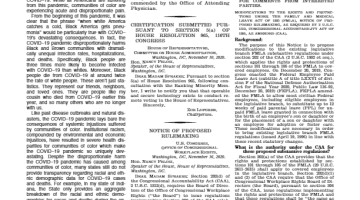H5760 health crisis. I urge my colleagues to join me in supporting additional federal assistance to fight this pandemic and protecting our communities of color.
Mr. CARSON of Indiana. Mr. Speaker, I rise today in support of the Tri-Caucus’ Special Order to highlight the disproportionate impact of COVID–19 on communities of color. Our nation is currently overwhelmed by unprecedented numbers of COVID–19 cases, hospitalizations and deaths. After more than eight months of suffering, the COVID–19 pandemic continues to ravage our communities, creating incalculable pain, massive economic disruption, and immense strain on our public health system. As of this moment, more than 246,000 Americans have lost their lives from this deadly disease. More than eleven million have been infected, and nearly 70,000 are currently hospitalized with severe cases of COVID–19. While all Americans are suffering from this pandemic, communities of color are experiencing acute and disproportionate pain.
From the beginning of this pandemic, it was clear that the phrase ‘‘when white America catches a cold, Black America gets pneumonia’’ would be particularly true with COVID– 19’s devastating consequences. In fact, the COVID–19 pandemic disproportionately harms Black and Brown communities with dramatically unequal infection rates, hospitalizations, and deaths. Specifically, Black people are three times more likely to become infected with COVID–19 than whites. Moreover, Black people die from COVID–19 at around twice the rate of white people. These aren’t just statistics. They represent our friends, neighbors, and loved ones. They are people like my cousin who died from COVID–19 earlier this year, and so many others who are no longer with us.
Like past disease outbreaks and natural disasters, the COVID–19 pandemic lays bare the consequences of systemic injustices suffered by communities of color. Institutional racism, compounded by environmental and economic injustices, have resulted in severe health disparities for communities of color which make the COVID–19 pandemic so uniquely devastating.
